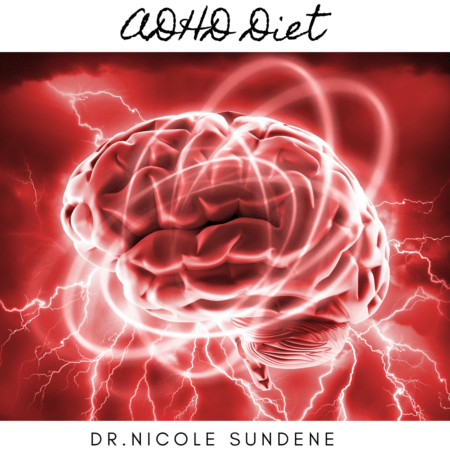
Dr. Nicole Sundene, NMD
Holistic Psychiatry & Hormones
This diet is not just for those with ADHD.
Whether you have ADHD, think you have ADHD, are told by others that you are completely ADD, are worried about age-related memory loss, have chronic brain fog, or simply cannot focus; a few simple diet changes can help improve your concentration abilities. Check out my blogs on Rosemary and Ginkgo biloba to help your concentration using simple and safe herbal medicines along with diet.
Eating smart and healthy should also improve your overall productivity.
Let’s face it, we all could benefit from being more focused and cognitive. If this list is overwhelming, then you will most likely REALLY benefit from changing your eating habits. Please don’t be overwhelmed though, adopting a new eating plan takes time and effort at first. When I first began to research "Alternatives to Ritalin," for my own purposes back in 1994, I had terrible eating habits and was binging on a lot of fast food and candy that greatly impacted my ADD. Since I spent all my time studying or working and I lived in a dorm my diet was terrible and my ADHD worsened. It took a lot of time and effort to get my eating on track and I struggled to make immediate changes. However, I can now live Ritalin free and stay focused without having to deal with all the yucky side effects of taking that medication that would make me feel sweaty, shaky, nervous, and would occasionally cause my heart to race.
So if I can do it... then anyone can do it. You just need to focus on one thing at a time if you struggle with dietary changes. Start adding in the easiest things on my list and you will notice improvements that will help you stay motivated to tackle the next steps. Simply try making one change at a time until you have it down. They say it takes 28 days to make a new habit. To overcome a bad case of the “I cants” simply find one thing that you CAN do at a time and work on that!
Let’s quickly review the dietary Do and Dont’s of eating for ADHD, ADD, and better concentration…
Do:
Don’t:
I hope that helps get you started in the right direction. Anyone with ADHD, poor concentration, or memory problems should see improvement within a week or so with this eating plan. Overall improvement will be noted after a month of following this eating plan for better concentration and memory. Many women with concentration issues are actually struggling with hormone imbalance from menopausal hormone changes, perimenopause, as well as hypothyroidism can also cause brain fog, insomnia, and difficulty concentrating.
Thank you for your Women's Health and Herbal Medicine questions. Please send them to me on a postcard to the address below as I love to get something in the mail that is not a bill. Remember if your question cannot fit on a postcard then you need to treat yourself to a Naturopathic visit with me. Simply pop over to my SCHEDULE page to get set up. I love helping women with their ADHD, memory, hormones, and chronic fatigue.
Dr. Nicole Sundene, NMD
(480) 837-0900
Dr. Sundene is a Naturopathic Doctor in Scottsdale, Arizona, and is considered a Female Hormone Expert in Women's Health and Bioidentical Hormones. She specializes in Holistic Women's Health for Menopause, Thyroid, Hashimotos, PMS, Perimenopause, Autoimmune, Postpartum, Chronic Fatigue, Depression, Anxiety, Food Allergies, Digestion, Dermatology , Acne, Psoriasis, Eczema and Adrenal Hormonal Conditions. In 1999 she began working for a Hormone Doctor prior to starting Naturopathic Medical School. With over 22 years of experience in both Prescription and Natural women's health and hormones, she presents to women the best-integrated health solutions for their Chronic Disease. She has been an Herbalist for over 27 years and enjoys teaching women how to use herbs to balance their hormones, nutrition and optimize their health. Dr. Sundene relies on blood testing for her hormone metrics. The hormone testing is covered per the patient's insurance plan and conducted at certain points in the woman's menstrual cycle. To learn more about Hormone Testing for Women Visit: Bioidentical Hormones. Follow Dr. Sundene on Instagram, Twitter, and Facebook for more tips on Women's Health, Female Hormones, and Naturopathy!
References:
1. PMID: 7247635 Effects of artificial food colrings in children with hyperactive symptoms. A critical review and results of a controlled study. Arch Gen Psychiatry
2. PMID: 3395307 Synthetic food colorings and behavior: a dose-response effect in a double-blind placebo-controlled, repeated-measure study. J Pediatr.
3. PMID: 349320 Hyperkinesis and diet: a double-blind crossover trial with tartrazine challenge.
4. PMID: 8257176 Effects of a few food diets in attention deficit disorder. Arch Dis Child.
5. PMID: 2857900 Controlled trial of oligoantigenic diet in the treatment of hyperkinetic syndrome. Lancet.
6. PMID: 9257090 Does oligoantigenic diet influence hyperactive/conduct disordered children. A controlled trial. Eur Child Adolesc Psych.
7. PMID: 8277950 Effects of diets high in sucrose or aspartame on the behavior and cognitive performance of children. N Engl J Med.
8. PMID: 3674234 Effects of sugar and aspartame on aggression and activity in children. Am J Psychiatry.
9. PMID: 194563 Effects of sugar on aggressive and inattentive behavior in children with attention deficit disorder with hyperactivity and normal children. Pediatrics.
10. PMID: 16314082 Supplementation with flax oil and vitamin C improves the outcome of ADHD. Essential Fatty Acids 2006.
11. PMID: 15741051 The effect of fish oil on physical aggression in school children a randomized, double-blind, placebo-controlled trial. J Nutr. Biochem.
12. PMID: 14985685 Effect of docosahexaenoic adic-containing food administration on symptoms of attention-deficit/hyperactivity disorder- a placebo-controlled double-blind study. Eur J Clin Nutr.
13. PMID: 2539203 Gamma linolenic acid for attention deficit hyperactivity disorder; placebo-controlled comparison to D-amphetamine. Biol Psychiatry.
14. PMID: 12873849 Consumption of fish and n-3 fatty acids and risk of incident of Alzheimer disease. Arch Neurol.
15. PMID: 12580703 Dietary fats and the risk of incident of Alzheimer's disease. Arch Neurol.
16. PMID: 12380746 Similarities and differences between Alzheimer's disease and vascular dementia from the viewpoint of nutrition. Ann NY Acad Sci.


